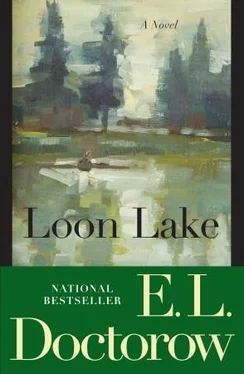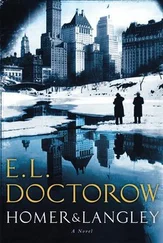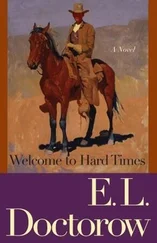She touched her fingers to my lips.
“He couldn’t have been placed better,” I said. “It was a secret strike plan, nobody knew except the officers. And then the company took out half the machines.”
“Some men came to their house this afternoon,” she said.
“What?”
“Just when it was getting dark. We happened to be on our side. At first Sandy thought it was the radio, that she left it on.”
“Did you get a look at them?”
“I didn’t want to. I heard what they were doing. They tore the place apart.”
“Jesus.”
“It’s lousy that she got hit with all this,” she said.
“Well, now I know why they didn’t believe him.”
“What? I don’t think you should try to talk.”
“No, it’s all right, I’m doped up. I’m saying he was trying to pin it on me. I guess he couldn’t think of anything better.”
“What?”
“But they weren’t buying it because they must have got into his files.” I found myself panting in the effort to speak. I was having trouble catching my breath.
At this moment I saw in Clara’s calm regard the disinterested under-Standing of a beat-up face — as if nothing I had to say was as expressive as the condition I was in.
“He tried to make me the fink,” I said. I realized I was crying. “The son of a bitch. The goddamn hillbilly son of a bitch!”
She turned away.
I stayed that night in the hospital and once or twice I realized the moans on the ward were my own.
In the morning I caught a glimpse of myself in the metal mirror of the bathroom — arm in a sling, a swollen one-sided face, a beauty of a shiner. I found myself pissing blood.
I was released — I supposed on the grounds that I was still breathing. I walked a couple of blocks to the car line. A clear cold morning. I sat in the streetcar as it gradually was engulfed in the tide of men walking to work. I thought of trying to work the line with a broken arm. I was out of a job.
Men stepped aside to let the streetcar through. Faces looked up at me. I had pretended to be one of them. That was the detective’s sin.
When I got home I found Clara and Sandy James and the baby asleep in my bed. The house was cold and there was a fetid smell, faintly redolent of throw-up or death, it was a very personal smell of mourning or despair. I got the fire going in the coal stove — I was learning with each passing moment the surprises of a one-armed life.
I went next door. The place was a shambles. Red’s desk had been jimmied open, the sofa cushions and chair cushions were piled up, the braided rug was thrown back, his collection of pulp magazines was tossed everywhere. His secretarial ledgers were on the floor, one with the names and addresses of the membership, another with his meeting minutes. I found boxes of mimeographed form letters, a loose-leaf folder with directives of the National Labor Relations Board, a scattered pack of blank union cards.
Inside the splintered front door, stuck in a crack, was the carbon copy of a handwritten memo dated some months before. It had been stepped on. It was addressed to someone with the initials C.I.S. It was signed not with a name but with a number. But I could tell who the writer was, Red wrote a very chatty espionage report, very folksy. He spelled grievance greevins .
The bedroom was no less worked over. I straightened the mattress and lay down and pulled a blanket over me. I knew that I should be thinking but I couldn’t seem to make the effort. Eventually I fell asleep. A wind came along and worked at the broken front door, banging it open, banging it closed, and I kept waking or coming to with the intention of seeing who it was, who it was at the door who wanted to come into this pain and taste of blood.
In the parlor a man was picking up papers and tapping them into alignment on the floor. It was the tapping that woke me.
“Hey, pal,” he said.
He wore a topcoat that was open and followed him like a train as he duckwalked from one item to another. His hat was pushed back on his head.
He stood up with an effort. “Oh boy,” he said, “these old bones ain’t what they used to be.”
A lean face, pitted and scarred, very thick black eyebrows, and carbon-black eyes with deep grainy circles of black under them. A heavy five o’clock shadow. But the skin under all was pale and unhealthy-looking. He had collected Red’s union records and was stuffing them now in a briefcase. He righted the armchairs and looked under the cushions. He felt around the desk drawers. He stacked Red’s pulps, flipping through each one to see if there was anything in it. He was very thorough. And all the while he talked.
“Whatsamatter, the lady’s husband come home early? Well, you tell me: was it worth it? I’ll tell you: no. I know about ginch. It is seldom worth it. It is seldom worth what you have to go through to get it. I been married twice myself. I was happy in love for maybe five minutes each of those women.”
It was speech intending to divert, patronizing speech, his eyes and hands busy all the while.
“Put that stuff back,” I said. “It doesn’t belong to you.”
He smiled and shook his head. He came toward me. “Where’s the widow?” he said.
“What?”
“His bereaved.”
“I don’t know.”
He came over to me. “Hey, kid, look at you. Look at how they worked you over. How much can you take? What’s the matter with you?”
I immediately recognized the professionalism of the threat.
“Listen,” he said, “don’t be a wiseass. I’m here with the money, her death benefit.” He waved an envelope in front of my eyes. I could feel the breeze on my hot face.
“She’s at my place. I’ll get her.”
“I would be grateful,” he said.
The women were up, they were in the kitchen, Clara was drinking coffee, she was wearing the clothes she had slept in, she looked gaunt, grim.
Sandy James’ eyes were large and glistening with the unassuageable hurt of someone betrayed. The corners of her mouth were turned down. She was trying to feed her baby and the baby was enraged, it was twisting and turning, and making dry smacking sounds. It pulled on her breast and waved its tiny arms.
I explained, but even as I did he appeared in the doorway behind me. Sandy stood and thrust the baby at me and pulled her dress closed and buttoned the buttons while I held the crying baby, wriggling and twisting against my cast.
Now we all stood there frozen in that way of those overtaken by ceremony. Even the baby quieted down.
“I’m sorry for your trouble, Mrs. James,” the man said. He held a legal-looking paper in one hand, an uncapped fountain pen in the other. “Your husband, Mr. James, was a brave man. The company knows it has a responsibility to his family. It ain’t something we have to do, you understand, but in these cases we like to. If you will sign this receipt and waiver, both copies, I have a death-benefit sum of two hundred and fifty dollars cash on the barrelhead.”
Sandy James looked at Clara. Clara sat with her head lowered, the fall of her hair hiding her face.
Sandy James looked at me. I knew what the waiver meant. Two hundred and fifty dollars seemed to be the going rate. Sandy James age fifteen was in no position to sue anybody. I nodded and she signed the waiver.
The fellow tucked one copy in his pocket and put the other on the table. He glanced at Clara. He took out his wallet and counted the money and put it in Sandy’s hand. He came over to me and stuck his finger in the baby’s cheek. “Hey, beauty,” he said. He looked at me and laughed. “Beauty and the beast,” he said.
When he was gone Clara found a cigarette and lit it.
“Two one-hundred-dollar beels,” Sandy James said. “And a fifty-dollar beel.”
Читать дальше











